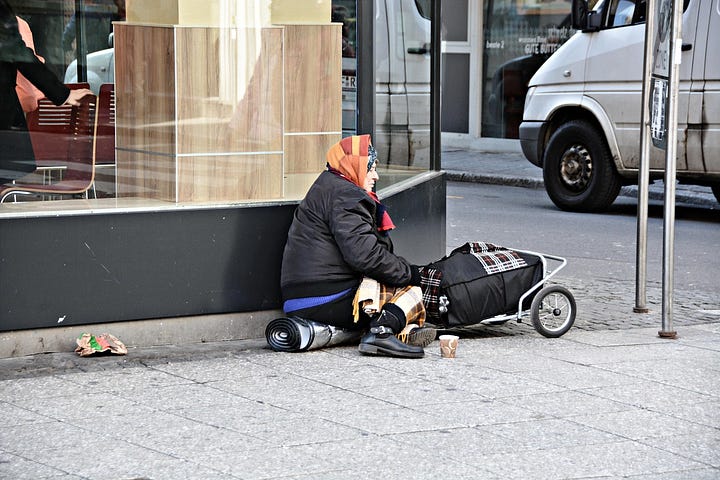Chapter 1 - Capitalism & The Social Contract
In this series, political commentator John Scully argues the Left has lost its way, focusing on banning plastic straws instead of building an American where all people can work & lead dignified lives.
The social contract between labor and capital is failing. Simply put, the rich get richer at the expense of everyone else. Work no longer provides for the basic needs of working people and their families. The Left has spun off into a fragmented wilderness of innumerable policy demands, forgetting that work is the basis of a healthy society. To lead the country out of the wilderness, the Left must turn its energy to making work pay for life’s basics – food, home, health, financial security and protection from the coming AI upheaval. Success will not come without a change of attitude toward empathy and caring for all working people no matter their cultural, religious or political background. Chapter 2, Chapter 3 Chapter 4 and Chapter 5.


Right: by Goumbik. Left: by Wolfgang van de Rydt. From Pixabay.com.
The Origin of Capitalism
There are two seeds at the basis of human life. They are inseparable twins. The first is economic activity, the need to gain something of value in order to eat. The second is selfishness/power, the need to keep all gains at the expense of others (It can also be called "greed"). One seed sprouts only as the other does.
Love, family, friendship, altruism all depend on humanity's ability to eat and to gain something beyond the ability to eat. So too does capitalism.
At its most basic, a human society requires that its members have enough wealth to eat. The daily effort to earn enough to eat is successful. In a static society, this can continue forever. No one starves, no one gains more than others.
But, human societies are not static. The inseparable twins of economic activity and selfishness/power are genetically implanted within them. So too is an inborn (genetic) disparity of human ability. Be it from greater intelligence, greater beauty, personality (e.g. self-discipline) or just plain luck, human abilities vary tremendously. Thus, is born entrepreneurship. In the quest for gain in order to eat, some humans are more capable than others. Some gain more than others. Some gain more than is needed to eat. This excess beyond what is needed to eat can then be put into love, family, altruism, etc.
Or, it can be used to buy the means to gain more. When the twin seeds of basic economic activity needed to eat and selfish greed create an economic surplus beyond eating (and loving, family and altruism), capital has been created. Capital IS that excess, and capitalism is the use of capital to create more wealth. (Capital is a subcategory of wealth. Creation of wealth is necessary for the creation of capital, but not all wealth is used for capital creation. Think of the parable of the 5, 3 and 1 talents.)
“Society's members are generally aware of when the “social contract” is healthy and not healthy. This perception is usually distorted by things like racial animosities, religious dogmas, ideology and just sheer ignorance and stupidity among the general population. And, these distortions are generally utilized by the wealthy to manipulate society's members into not noticing the accumulation of wealth in their hands. But, a society out of equilibrium, where wealth is highly skewed and deprivation is clear, is usually obvious to its citizens.”
The Growth of Capital & Wealth
Imagine a primal society where the twin seeds are just sprouting. A proto entrepreneur has gained enough to pay for his cart and buy another which he then rents or uses for more gain. He hires a driver and pays him a wage. He attracts more business, buys more carts and hires more drivers. Each driver in turn spends his wage in the community creating the need for more goods and services which other entrepreneurs then create. The proto entrepreneur not only has created more capital for himself, but he has also grown the community's wealth.
I am no economist, but in a favorable environment, societies have been creating capital for millennia. European nations started centuries ago. If you need proof of the ability of some societies to create wealth, look no further than China which has created vast wealth for its society within a few decades. Vietnam is rapidly doing the same.
So, basically, the need to eat and selfishness create capital. The entrepreneur gathers enough wealth to create and sell goods and services to others. This dynamic suffuses society in a complex web of buying and selling of goods and services all of which generates more capital and wealth. Somehow, this is all self-coordinating because someone is there to buy those goods and services. I suppose that this is what economists call the "Invisible Hand" of the market.
Without a Predictable Environment, Capital Formation Fails
The proto entrepreneur will not create capital if he cannot predict with some degree of assurance that his investment will return a profit. If his effort is consistently for naught, he will not try. Success requires an environment in which there is sufficient stability of expectations that investments succeed more than they fail.
I imagine a theoretical inflection point of predictability below which capital formation cannot grow and above which capital formation can grow. Go much below this point, and capital formation dies entirely. Go much above and capital formation can thrive. Those of you versed in economics probably know the name of this inflection point, but I don't, so I will call it the “capital tipping point” for capital formation.
Vast forces work endlessly to depress capital formation below the capital tipping point. Within the very seed of selfishness/power lies capital's greatest enemy -- Power. The proto entrepreneur deploying a fleet of carts will use all means at his disposal to prevent competition by a rival. If he can't prevent her from forming her own cart company, he will collude with her against potential rivals and, if successful in limiting competition, they will charge exorbitant prices at the expense of the whole society.
I do not need to detail the thousands of ways capital formation can be depressed by the use of power. The cart cartel can utilize existing governmental authority (democratic or authoritarian) to create rules, punishments and taxes to penalize competitors and drive them out of the market. In truly gangster states, they use the power of the state to steal the fruits of the entrepreneurs and at times simply murder them. Capitalism is its own worst enemy.
Other forces destroy capital formation. Corruption diverts wealth into useless benefits for the powerful. Lawlessness and impunity allow the powerful to plunder entrepreneurs. If the cart man must pay the neighborhood gang most or all of his profit every Saturday morning, he will simply quit his business. If a society faces only plunder, degradation and death, it's people will flee. Think Venezuela, El Salvador (the Savior), and Honduras.
If enough of these forces combine, capital formation will sink below the capital tipping point and cease or be so severely retarded that society's wealth stops growing and recedes.
Socialism
What is it? Let's go back to a primal society where the twin seeds of the need to gain to eat and selfishness are sprouting. But, instead of an individual man and woman setting up their cart businesses in the society, society itself decides to create this and all other goods and services.
Society also punishes individuals who try. The incentive to create wealth (and capital) does not exist, and the entrepreneur vanishes. Vast and punitive bureaucracy grows to attempt to create what a free market does to match supply and demand. Inevitably this fails descending into the corruption and the entropy of socialism.
Healthy Capitalism & Democracy
Society is a group of people. The inhabitants are bound by a common culture, a set of expectations which define their roles and the roles of others in the group.
In our western capitalist democracies we generally assume that there will be some sharing of society's wealth. The wealth of the entrepreneur will be shared with those that work for the entrepreneur. And, this sharing will be sufficient that there will not be obvious poverty and deprivation among those who labor to fulfill the entrepreneur's need. I would call this a healthy capitalism's social contract. Concentrate wealth among too few members of society and the obvious (or perceived) deprivation among the many stretches this social contract to the breaking point. The resulting social earthquakes are generally very damaging (Think communism, fascism).
I believe that a society's members are generally aware of this social contract and when it is healthy and not healthy. This perception is usually distorted by things like racial animosities, religious dogmas, ideology and just sheer ignorance and stupidity among the general population. And, these distortions are generally utilized by the wealthy to manipulate society's members into not noticing the accumulation of wealth in their hands. But, a society out of equilibrium, where wealth is highly skewed and deprivation is clear, is usually obvious to its citizens.
If shared wealth is a characteristic of a healthy capitalist society in social equilibrium, what are its characteristics? I see this through the lens of work. If I am to work for the entrepreneur, I want my work to be rewarded sufficiently that I can live a decent life. This would include a decent home, education for my children, affordable health care, and some degree of safety from acts of God. My wage should provide this without my having to seek charity from others or the State. Even Henry Ford thought that his employees should earn enough to buy their own product. Otto von Bismark, the Iron Chancellor, over a century ago, opined that all German workers should have health care.
The problem is that in a large capitalist society, good wages are not enough to provide the above decent life in sufficient measure for all members. For reasons that any but the stupid or willfully blind can see, a reasonable wage is often not enough to keep an individual from deprivation. Illness, accident, the cost of education, failures of capitalism itself (Think the great depression and recent great recession) put the elements of the good life out of the reach of millions who believe that they are working within a social contract. For them, the social equilibrium collapses. If too many are similarly affected, the society's equilibrium is threatened. Capitalism becomes unhealthy.
In a capitalism-based democracy, the task of maintaining society's health belongs to the citizen. Through their votes, they choose representatives who are tasked with making public policy that will strengthen society's equilibrium. This public policy will direct public resources (tax revenues) into maintaining a decent life. This is not charity but a social guarantee of those parts of a decent life that a decent wage for individuals cannot guarantee. Such public policy is simply part of the social contract on which a healthy capitalist society rests.
So, a healthy capitalist society must provide a decent ("living") wage to individual workers, and it must protect them from those things that such a wage cannot do so by itself. Otherwise, the social contract is broken for the unfortunate individual. Too many such individual breaks and the whole is threatened.
Is This Socialism?
Of course it isn't! Unfortunately, in our current deranged political environment, the Republican party is attempting to portray the allocation of even one dollar to the public good as "socialism". This is driven by those of extreme wealth (Think Koch brothers) who want to increase that wealth at our expense.
Who Is John Scully?
John Scully graduated college in 1964. Leaving a sheltered environment limited by the social expectations of the time and place, in 1964 Mr. Scully spent two years as a volunteer in Laos. He learned the language, and living in remote villages, worked with the Laotians to improve sanitation and build schools. This eye- opening experience began a life-long process of examining the hidden social motivators that cause us to act the way we do.
After starting a family, Mr. Scully went to work for the Federal Government, starting with the Department of Health, Education and Welfare, as a management intern. He reached Senior Executive rank in 1982 at which time he transferred for a two-year tour as Deputy Associate Commissioner for Disability with the Social Security Administration in Baltimore, Md. In 1984 he again transferred to be the Deputy Director of Management Operations at NASA’s Goddard Space Flight Center.
Management Operations provided the administrative services that support the Center. These services are governed by complex, voluminous regulations which guide the actions of the civil servants in procurement, human resources, finance, construction, IT and so on. As an outsider, many of the rules, and the actions of the administrative staff to enforce them, seemed to be unnecessary and aggravating to the scientists and engineers we were supposedly supporting.
Over 10 years Mr. Scully kept a growing log of these seemingly unnecessary rules and procedures. When Bill Clinton announced Al Gore’s Reinventing Government effort, based on a book by that name by David Osborne, Mr. Scully sent his 15- page log to Mr. Osborne and quickly received an invitation to join the effort. He spent the next 9 months working on the procurement and information technology teams.
After this experience, it was difficult to return to work as usual at Goddard so in 1996 he took an early out and retired. This began the best part of his life and a continuing quest to figure it all out.



